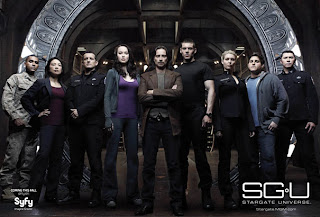
I just finished watching Stargate: Universe on demand on Netflix and I have to tell you: It doesn't suck.
I started watching Stargate: SG1 when it premiered on TV, and then stopped after a few episodes, but I eventually picked it back up on DVD. I watched nine seasons worth before I gave up on it as being silly, contrived and with diminishing production values. Then suddenly they were talking about going to Atlantis, of all places, and I decided to let it go.
But I came back to SG: Atlantis about halfway through the second season and I was intrigued enough to give it a shot. But it was just as silly and contrived as as SG1 so I stopped.
Then SG: Universe came out. By then I was so jaded that I couldn't conceive that the show would be any good, even though some of my friends said it wasn't bad. But they weren't excited about it, so that was a sure sign for me to let sleeping dogs lie.
Recently it popped up on Netflix on demand, and I figured I'd give the pilot a try while I folded laundry. Thank god for laundry, I have to tell you. If I'd devoted my attention to the first ten minutes or so, I probably would have turned it off. With cameos from the SG1 cast, and with the same hackneyed acting I would have stopped watching and never looked back. But I wasn't paying attention. Sometime between folding all my underwear and staring on the towels, the show got good. It got really good. So good that I had to rewind, put the laundry to the side and sit down to watch.
Basic premise: bunch of people stranded on a ship in the middle of nowhere with no hope of rescue. The ship itself, however, is falling apart and their presence has only exacerbated the problem. So within the first moments they have to learn to work together to fix the ship while fighting panic and learning how the new world works. Immediately, a critical moral quandary arises. And someone important dies. Just like that. It proved that it had the chops to make the hard calls in the first hour and it has maintained those chops throughout the first two seasons.
Will it fall into ignominy and victim to the silliness of Atlantis and SG1 prior? Perhaps. The potential certainly exists. Several stories have been borderline abysmal. But when it excels it really excels. Of particular note is the way in which it deals with time travel. Yeah, time-travel; we know the trope and we know that most shows do it very poorly. Even Dr. Who has its problems and its a show predicated upon traveling through space and time.
But SG: Universe does it with aplomb.
First, it lays out the ground rules, rules already established in SG1. They're silly rules, and feel like the arbitrariness of a bored writer in a hurry. Nevertheless, this is the continuity in which the story exists, so that's how this show will play the game. But it treats those rules with respect and examines the ramifications of each instance, following them along lines of reasoning that have dire moral implications. It isn't shy about it, either. Paradoxes are treated with respect, and made integral to the character's progressions.
Ultimately, this is a show about the characters. Well rounded characters have always made for good television. More than stereotypes--the nerd, the pretty girl, the corn-fed American soldier-boy, tough-as-nails black man, stern leader--these characters have foibles, flaws and, more often than not, virtues. But when they err, people die. Though sometimes those deaths are caused by negligence, caprice or simple exhaustion, it is always on the part of the characters, and not the story writers.
So, while at first I was surprised that it was good for an iteration of Stargate, have come to love it as being good in its own right. You should give it a chance, it's on Netflix.
Update: When I wrote this review I had just finished the second season, on what I assumed was the end of season cliff-hanger.
ReplyDeleteTurns out it was the series finale. So I guess I can't about this show "having" potential in the present tense. It had potential. Past tense.
And it's a bummer that it was burdened with all the previous Stargate incarnations' crap. Because I think it could have been something awesome.